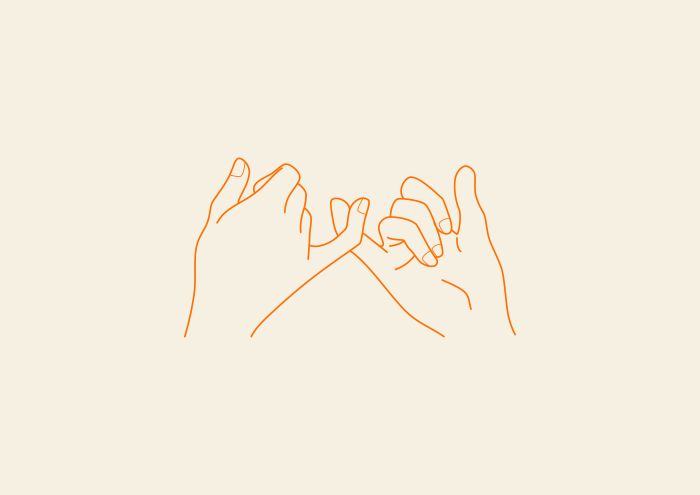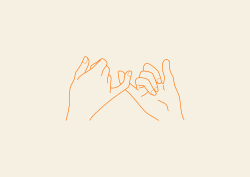Unwanted pregnancy: Maxime talks about her abortion experience
Committing abortion for an unwanted pregnancy is the only medical treatment in the Netherlands that is still in the Code of Criminal Procedure. As if it were a criminal act. Cycle believes that having an abortion should not be accompanied by shame. Talk about your abortion! With you, an average of 30,000 women a year make the choice for an abortion*, so you are not alone. Talking helps with psychological processing and breaks the taboo.
We talked to Maxime (28):
I was always told that it would be incredibly difficult to get pregnant. My uterine lining is extremely thin, so the chances of an egg implanting are very small. I never thought getting pregnant was an option, so I only took the test to comfort my boyfriend as I hadn’t gotten my period in a while. It was a complete surprise when the test turned out to be positive.
I have a child wish, but my boyfriend didn’t want to keep it. I don’t want to place a child on this earth as long as both parents don’t support it 100%. He would support me if I wanted to keep it, but he did tell me he actually wasn’t ready for it. That’s why I made the decision to remove it, because I didn’t want to do it on my own. It has a major impact on our relationship and it is really tough. Especially because I was the one who eventually had to make the decision in the end and it made me feel really alone. It took a lot of time and effort for me to not blame my boyfriend. Although I still feel that from time to time, because I did it largely for him.
‘To them, it is assembly line work’
I found out I was pregnant in the middle of the covid epidemic, so I only had contact with my GP via phone calls. I had to find out a lot myself on the internet, especially about the different options I had. In the end, I decided to have a surgical abortion under anesthesia. I had a terrible experience trying to get in contact with the abortion clinic. I called them and was immediately put on hold. As I was waiting the realization dawned on: 30.000 abortions are performed every single year, so they are very busy. To them, it is just assembly line work. When I finally managed to speak with the receptionist, she was very aloof. I made an appointment and that was that.
On the day of the procedure, I went into the clinic alone. My boyfriend had to wait outside in the car; he wasn’t allowed inside due to covid regulations. The clinic looked very shabby. When I asked them about it, they told me that there is a lot less money than a few years ago and because of that they can’t replace equipment or keep the supplies up to date. Back then, for example, they still had a cabinet filled with contraceptives for girls or women from religious families who can’t easily get those products themselves. But they don’t have that anymore now.
An ultrasound was done and they turned away the screen so I couldn’t see it. I wanted to have a printout of the ultrasound and was given one, which was very nice. A conversation about different kinds of contraceptives followed. I chose to have an IUD inserted immediately after the surgery. I was then taken to a room with six beds, awaiting the procedure. The treatment room was attached to that room.
‘She was pretty much thrown into bed’
There were three other girls in the waiting room already, which I didn’t like at all. I could literally hear the surgical abortion happening of the girl before me. She was then wheeled into the room half-naked and she was pretty much thrown into bed. She was barely conscious and was crying from the pain. It was very confronting to see, because I still had to have my procedure. Are they going to wheel me in as well and throw me in bed too? I was already struggling with the fact that I was going to have an abortion and this did not make it easier for me. The girl who was waiting next to me looked really nervous. The nurse snarled at her and said: ‘Don’t look at me like that, it’s not like I’m going to hurt you.’ I really resented that. If you do a job like this, you should never have an attitude like that. You should always be empathic. Who knows what that girl has been through to end up here.
After waiting for 30 minutes it was my turn. I had to take off my pants and my underwear and lay down in a sort of half chair with my legs in the support beams high up in the air. Both my arms and my ankles were tied down with straps. Honestly, I felt like I was trapped, it was all so intense. I woke up in my bed wearing underwear made out of gauze completely out of it. I don’t remember much from the car ride home, but my boyfriend told me later that I had asked him something: ‘I never have to do this again, right?’
I had a really heavy panic attack two days later. That same image returned of me strapped to that chair, completely helpless. The abortion also made me think about other things as well. I started to think about what I want in life and what I think is important. There’s some tension in my relationship with my boyfriend now. I had the expectation that he would understand how invasive of a procedure an abortion is, but it’s a different process for me. I understand now that it can’t be understood, that people don’t get how alone I feel. It’s the reason I want to tell my story.
We have to talk about the different kinds of emotions that can come up when you have an abortion. I sometimes feel ashamed that I had one. Sometimes I regret it. Sometimes I’m angry and sad and then the next day I think: this was the right thing to do. It feels like I’m at war with myself and my emotions and I am completely alone in dealing with these emotions. But there are so many other people who went through what I went through who also feel and struggle with these emotions. I tried to look for personal stories and books about it, but there aren’t many. On YouTube, I noticed that there are only videos about abortion from religious channels in which you are told that abortion is not the right choice.
Personally, I am very pro choice. Everyone should be able to make their own decision about their own body and thus also about abortion. Because of this, my experience at the clinic was extra disconcerting. Surely this cannot be the situation in the Netherlands? For some girls of religious backgrounds, for example, they have to go through this process without support, all alone, without being able to tell anyone. To then be received and helped like this is traumatic.
We asked Anne de Vries of Stichting Abortus Kliniek Amsterdam for a response to our article:
“Abortion is of all times and it can happen to anyone. It’s nothing to feel guilty about. How often does it happen through condom, IUD, pill? I am not for abortion, after all, no one wants to go through that. But if you do decide to have an abortion, then we have a team of very motivated doctors, nurses and receptionists, who are always working to help and support you. We don’t have a psychologist, because it is not our job to give psychological support. However, we can refer you to FIOM (the specialist on unwanted pregnancies) if you feel you are very sad about it.
By the way, I am not necessarily pro abortion. But the fact that many women are simply relieved that this intervention is possible is underexposed. So there are several sides to the story. Relief should not be underestimated: mothers with completed families, women who could never become pregnant and then accidentally become pregnant by the neighbor… The most extraordinary stories are told. For those people it is very nice that there is the possibility of ending a pregnancy.
Tips of the Cycle psychotherapist
Finally, psychotherapist Cobie Lutters has some tips for women facing the choice to terminate a pregnancy. “Most women who have had an abortion are at peace with it. The reason for abortion, whether it was free choice or you were (forced) to decide, plays a role. Nevertheless, an abortion remains a traumatic experience. Allow it to affect you; that works best for the coping process. Some women get tangled up with themselves because they did not adequately weigh and live through the process earlier. Then, if you do want children later in life and it doesn’t work out, for example, you can have mental health problems with that. It is enormously important that women facing this decision talk about it. This does not necessarily have to be with a therapist, it can also be with a confidant, such as a good friend, your mother, sister, or partner. Do you not have someone close to you that you trust enough to talk about it? Then seek professional counseling. In addition, it is always advisable to put the decision to abort on paper, so that you can always recall later why and how you came to the decision.”
Cycle also spoke with Martine (45) about her abortion experience.
*(Source: Fiom)
























